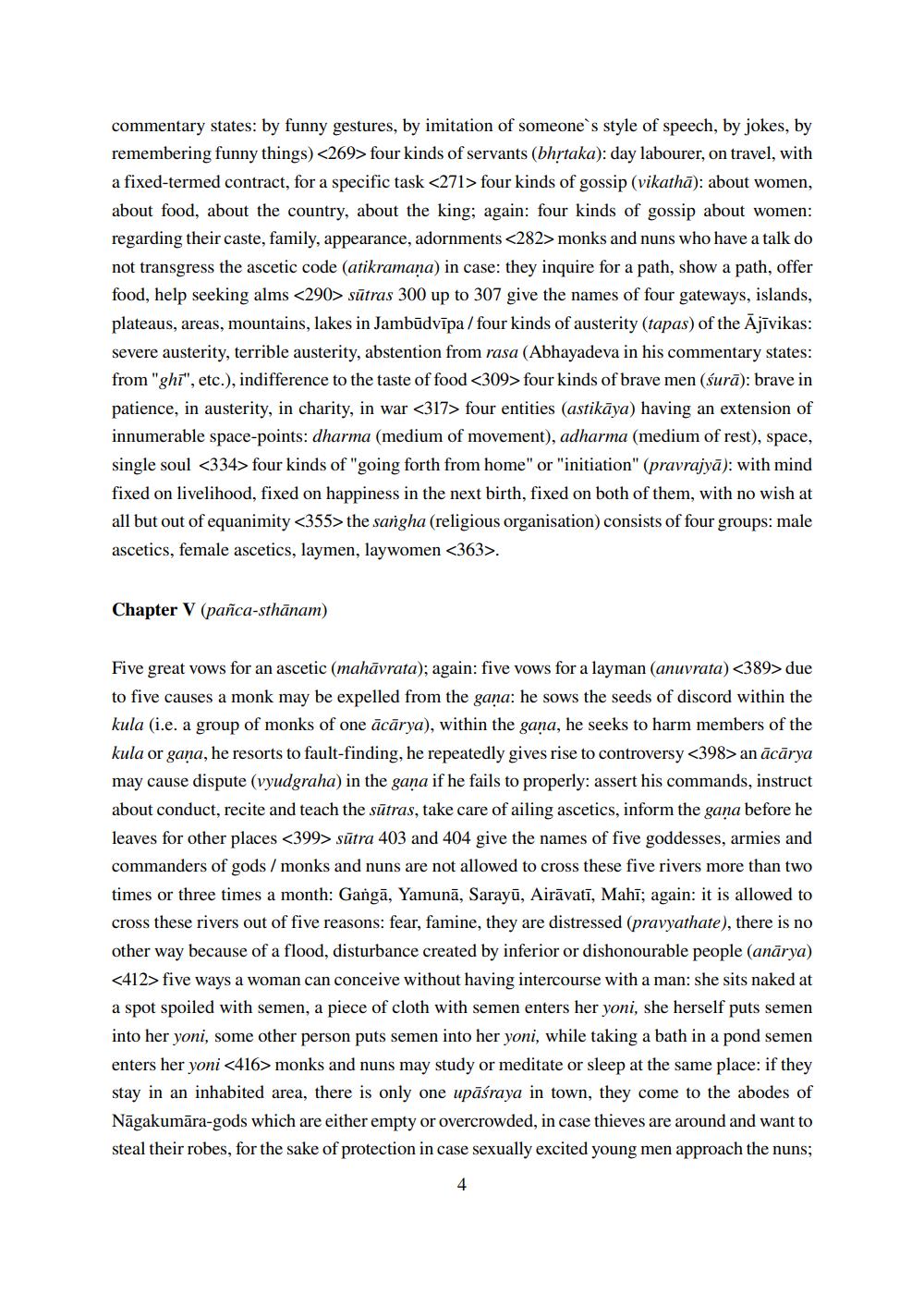Book Title: Sthanangasutra Author(s): Kornelius Krümpelmann Publisher: ZZZ Unknown View full book textPage 4
________________ commentary states: by funny gestures, by imitation of someone's style of speech, by jokes, by remembering funny things) <269> four kinds of servants (bhṛtaka): day labourer, on travel, with a fixed-termed contract, for a specific task <271> four kinds of gossip (vikathā): about women, about food, about the country, about the king; again: four kinds of gossip about women: regarding their caste, family, appearance, adornments <282> monks and nuns who have a talk do not transgress the ascetic code (atikramana) in case: they inquire for a path, show a path, offer food, help seeking alms <290> sutras 300 up to 307 give the names of four gateways, islands, plateaus, areas, mountains, lakes in Jambudvipa/four kinds of austerity (tapas) of the Ajivikas: severe austerity, terrible austerity, abstention from rasa (Abhayadeva in his commentary states: from "ghi", etc.), indifference to the taste of food <309> four kinds of brave men (surā): brave in patience, in austerity, in charity, in war <317> four entities (astikāya) having an extension of innumerable space-points: dharma (medium of movement), adharma (medium of rest), space, single soul <334> four kinds of "going forth from home" or "initiation" (pravrajya); with mind fixed on livelihood, fixed on happiness in the next birth, fixed on both of them, with no wish at all but out of equanimity <355> the sangha (religious organisation) consists of four groups: male ascetics, female ascetics, laymen, laywomen <363>. Chapter V (pañca-sthanam) Five great vows for an ascetic (mahāvrata); again: five vows for a layman (anuvrata) <389> due to five causes a monk may be expelled from the gana: he sows the seeds of discord within the kula (i.e. a group of monks of one ācārya), within the gana, he seeks to harm members of the kula or gana, he resorts to fault-finding, he repeatedly gives rise to controversy <398> an ācārya may cause dispute (vyudgraha) in the gana if he fails to properly: assert his commands, instruct about conduct, recite and teach the sutras, take care of ailing ascetics, inform the gana before he leaves for other places <399> sūtra 403 and 404 give the names of five goddesses, armies and commanders of gods / monks and nuns are not allowed to cross these five rivers more than two times or three times a month: Ganga, Yamuna, Sarayū, Airavati, Mahi; again: it is allowed to cross these rivers out of five reasons: fear, famine, they are distressed (pravyathate), there is no other way because of a flood, disturbance created by inferior or dishonourable people (anārya) <412> five ways a woman can conceive without having intercourse with a man: she sits naked at a spot spoiled with semen, a piece of cloth with semen enters her yoni, she herself puts semen into her yoni, some other person puts semen into her yoni, while taking a bath in a pond semen enters her yoni <416> monks and nuns may study or meditate or sleep at the same place: if they stay in an inhabited area, there is only one upaśraya in town, they come to the abodes of Nagakumara-gods which are either empty or overcrowded, in case thieves are around and want to steal their robes, for the sake of protection in case sexually excited young men approach the nuns; 4Page Navigation
1 2 3 4 5 6 7 8 9 10 11 12
